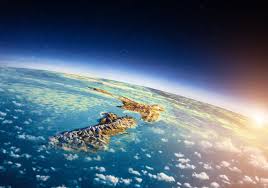Anyone can easily tell that a day on earth is of 24 hours, but was this the time limit of the day always the same and will it remain the same in future too. Scientists have claimed that in the coming time, the duration of the day can be more than 24 hours because it has been increasing for the past thousands of years. At one time the day on earth was less than 24 hours and it is estimated that it will keep increasing with time. Such a time can also come in the future when the time of day will be 25 hours instead of 24.
According to the report of Live Science, once every 24 hours, the earth completes one rotation on its axis, which shows one day. According to the duration of rotation of the earth on its axis i.e. one day, man decides his working and sleeping hours.
That is, in a way, this time of rotation of the earth gives a balanced life to the human being, but the day was not always of 24 hours like this. Sarah Milholland, an assistant professor of physics at MIT, says that a long time ago, the Earth’s day was very short.
A billion years ago, the day was 19 hours
Milholland told Live Science that the Earth has experienced days that were shorter than now. About a billion years ago, the length of the day was only about 19 hours. At the time of the formation of the Earth, the Earth used to rotate on its axis in less than 10 hours. That is, a day was only 10 hours.
Konstantin Batygin, a professor of planetary science at Caltech, says that the Earth’s fast rotation was the result of a giant, moon-forming impact with a Mars-sized protoplanet. This accelerated the Earth’s angular momentum, breaking off enough of the planet’s surface to form the moon.
Milholland says that the Earth’s day will become longer than 24 hours. A few milliseconds have increased as a result of subtle changes in the planet’s molten core, oceans or atmosphere.
Milholland said that the Earth’s rotation is actually evidence of its planetary origin story. How fast a planet rotates is determined by how it was formed when dust, rocks and gas orbiting the Sun in the protoplanetary disk came together in space.
Is the time of Earth’s day still changing?
The length of Earth’s day may seem consistent and uniform to us, but it is not. Batygin and Milholland said that it is actually still changing. The day is constantly getting longer
but it is changing very slowly. The time of day is increasing by 1.7 milliseconds in a century. Batygin said, ‘Changes in the Earth’s spin rate are happening slowly so that evolutionary processes can adapt to changes over time. Over time, the Moon is slowly moving away from the Earth. In fact, this process is extremely slow and it may take 200 million years for the day on Earth to reach 25 hours.




